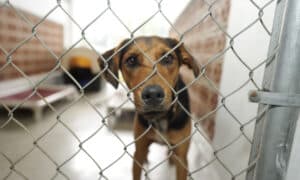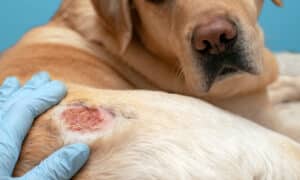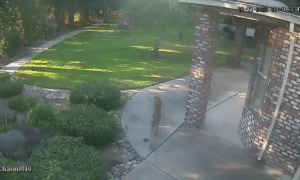“This post contains affiliate links, and I will be compensated if you make a purchase after clicking on my links.”
Every dog owner has heard them at one time or another – that old wives tale told to us by a well-meaning friend.
Is your dog sick? “Oh, just check to see if his nose is dry!” Is your dog licking his wounds? “Oh, that’s good, licking helps it to heal faster!”
While there may be some truth behind the myths, most of them are almost completely untrue. Here are 10 of the most commonly used myths & misconceptions about dogs:
1. Your pooch is sick if his nose is warm.

This is simply not true. Your dog’s nose temperature cannot denote illness or health. It also can’t indicate whether or not Fido has a fever. The only way to accurately determine if your pooch has a high body temperature is by measuring it with a thermometer. Normal temperature reading in dogs is between 100.5 to 102.5 °F.
2. It’s OK to give dogs table scraps.
Not all the time. Some foods on your table like pieces of fat and chicken bones can be lethal to dogs. While fatty foods can result in gastrointestinal distress and more severe complications, like pancreatitis, large bones can cause intestinal blockages or chicken and other cooked bones can splinter and puncture a dog’s intestines. Other foods commonly consumed at the dinner table are highly toxic to dogs, including onions, grapes, raisins, and chocolate. Instead of slipping scraps to your four-legged family, choose dog-safe treats and chews as a reward.
3. Licking heals wounds faster.

Although it’s natural for dogs to lick their wounds, this actually slows the healing process and can lead to serious problems and infections. If your dog is licking a wound repeatedly, you’ll need to protect the area by blocking access. An Elizabethan collar is the most effective way to stop your dog from licking wounds. To aid in the healing process, clean the wound thoroughly and apply a dog-safe antiseptic or wound cream.
4. Garlic kills fleas.
Garlic has not yet been scientifically proven to help in controlling flea infestation in dogs, despite evidence from pet parents that claim it works to keep them at bay. While it is possible that the scent is a deterrent to fleas, it does not kill them. Additionally, while garlic in small amounts has proven to be beneficial to dogs, large quantities can be toxic.
5. Dogs should have a litter prior to being spayed.

Another myth. Dogs that carry and birth a litter before being spayed are not found to be healthier in any way. As a matter of fact, dogs that are spayed before their first heat cycle tend to be less likely to be prone to breast cancer. Plus, spaying eliminates the risk of uterine cancers and complications. Although dogs should be spayed before their first heat cycle and before carrying any puppies, spaying should be done as late as possible.
6. Dogs eat inedible stuff because of nutritional imbalance.
Not necessarily. No one can point out exactly why some dogs eat rocks, animal stools, lick the concrete, and ingest things that should never be ingested. In truth, most veterinarians claim that dogs eat inedible stuff due to boredom or to get attention. To prevent boredom eating and chewing, give your dog adequate exercise and plenty of outlets for excess energy.
7. Indoor pets don’t need heartworm prevention.

Another lie. Even dogs that are mostly indoors are susceptible to heartworm disease. Remember, heartworm is contracted through mosquitoes, which obviously can come inside your house. In addition to a monthly heartworm preventative, take steps to prevent mosquitos from buzzing around. Before heading out on your evening walk, give your dog’s coat a quick spritz of natural mosquito repelling spray especially for dogs.
8. Your pooch will let you know when he’s sick or in pain.
This is a misconception. Dogs, in general, are good at hiding the signs that indicate that they are sick or feeling pain. Veterinarians and behaviorists speculate that this is instinctual, left over from their ancestors drive to survive by hiding any weakness. More often than not, by the time you see him sick, your dog’s condition has already progressed. Instead of waiting for your dog to indicate he’s not feeling well, keep an eye on his typical behavior and make note of any differences in the amount of time he spends sleeping, if he seems slower getting up or laying down, if she’s eating less than usual, and if he seems more distant or clingy. Also, take a quick glance at your pup’s poop every time he goes and make note of any differences in its appearance.
9. Dogs only eat grass when they’re sick.

This is partially true, partially not. Remember that domestic dogs share genetics with wild dogs and wolves that wholly eat their kill, including stomach contents like grass and berries. For this reason, a lot of scientists insist that it’s normal for a dog to eat some amount of grass from time to time since such material was once part of their usual diet. Other dogs nibble on the green stuff out of simple boredom, while others just like the taste.
Don’t worry if your dog makes a snack of your grass every now and again. However, dogs do occasionally gulp down large amounts of grass if they’re feeling sick to their stomachs. This isn’t your typical grazing on grass. Instead, a sick dog will chow down on several blades of grass, barely chewing them, and will usually immediately vomit. If your dog does this repeatedly or often, it’s best to book a trip to the vet.
10. Mixed breed dogs are healthier than purebreds.
Another lie. Both crossbreeds and purebreeds can either be healthy or not. While mutts usually don’t have the genetic diseases that are prevalent in purebred dogs, they are just as prone to health issues as a purebred dog is. Among purebred dogs, those from a reputable breeder that considers the health and vitality of the parent dogs before breeding tend to be far healthier overall than those that are bred by puppy mills or backyard breeders that don’t consider the health of the parent dogs.
What other myths or old wive’s tales have you heard about dogs or their health?























